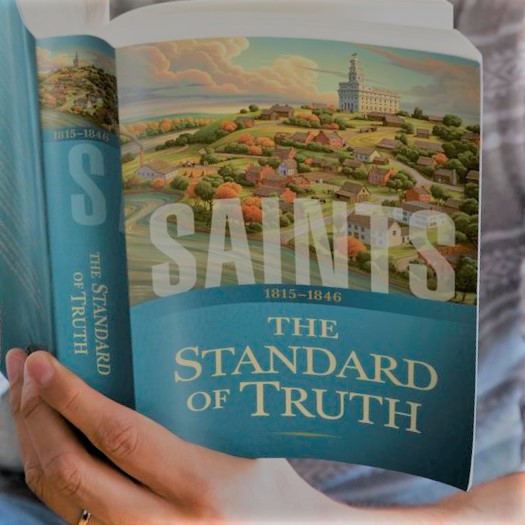S A I N T S: DISINGENOUS STATEMENT…
“[Joseph Smith, Jr.] read his Bible, trusted in Jesus Christ’s power to save him, and obeyed the Lord’s command not to join any church.”
Saints: The Standard of Truth 1815-1846 (Salt Lake City, UT: The Church of Jesus Christ of Latter-day Saints, 4 September 2018), 3:20.
There has been a push within the LDS church to align itself closer with Christianity. The 2018 April General Conference unveiled the revised HT/VT program’s use of the word “Ministering,” which has a specifically Protestant feel to it. Later in the year, LDS President Russell M. Nelson launched a campaign to distance the religion from the terms “Mormon” and “LDS.”
In chapter three (“Plates of Gold”) of the history “SAINTS,” we notice the church disingenuously hinting at yet another Christian ideal, salvation by grace, in stating that Joseph “trusted in Jesus Christ’s power to save him.” Although this could have been a very real feeling Joseph had, why make it seem like it is a common feeling among the 21st century church (which it clearly is not) by slipping it into the narrative in this manner?
This same deception continues in the sentence, by stating that Joseph “obeyed the Lord’s command not to join any church.” This gives the reader the false notion that this was not something on Joseph’s mind, nor would he ever act on it.
Joseph claimed that God appeared to him directly and told him to join no Church. In the Pearl of Great Price (Joseph Smith – History 1:19), he also explained their creeds were “an abomination.”
Yet, Joseph attempted to join the Methodist Church, where his wife was a member.
“I, with Joshua McKune, a local preacher at that time, I think in June 1828, heard on Saturday, that Joe Smith had joined the church on Wednesday afternoon, (as it was customary in those days to have circuit preaching at my father’s house on week-day). We thought it was a disgrace to the church to have a practicing necromancer, a dealer in enchantments and bleeding ghosts, in it. So, on Sunday we went to father’s, the place of meeting that day, and got there in season to see Smith and talked with him some time in father’s shop before the meeting. Told him that his occupation, habits, and moral character were at variance with the discipline, that his name would be a disgrace to the church, that there should have been recantation, confession and at least promised reformation-. That he could that day publicly ask that his name be stricken from the class book or stand an investigation. He chose the former, and did that very day make the request that his name be taken off the class book.”
Joseph Lewis, The Amboy Journal, 11 June 1879, page 1
Records from that year show that he was expelled from the Methodist faith.
http://www.ldsdefector.com/fact-0031/
http://www.utlm.org/onlineresources/josephsmithmethodist.htm
RE-rewrite: “[Joseph Smith, Jr.] read his Bible, trusted in Jesus Christ’s power to offer him salvation, and tried to obey the Lord’s command to join no other church, but ultimately desired to become a Methodist at the church Emma attended, only to be expelled from it in 1828.”

